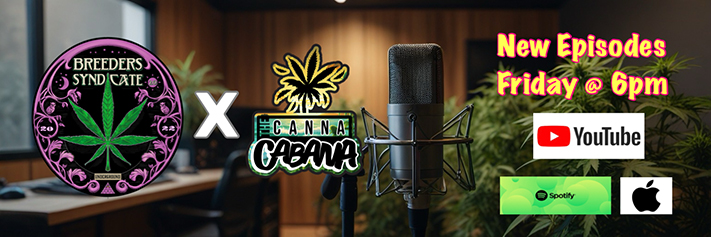Butcher Bob
Lone Wolf
Accuracy is sometimes ‘bad for business’ in Michigan’s world of marijuana testing
- Published: Feb. 01, 2024, 9:19 a.m.
- By Gus Burns
Test results, specifically for THC potency, play a major role in prices customers pay -- and profits retailers and growers reap -- for commercial marijuana across Michigan.
It’s such an important factor, that many industry insiders speculate unscrupulous, for-profit safety testing labs and marijuana producers are engaged in pay-to-play schemes, intentionally skewing potency reporting for the sake of profits. And safety labs committed to accurate results may be placing themselves at a competitive disadvantage.
“We never thought in a million years that providing accurate data would be the downfall of our business,” said Ben Rosman, co-founder and CEO of Ann Arbor’s PSI Labs, one of the first licensed marijuana safety labs in Michigan. “For a while, the accuracy ... helped build a great reputation for us, but that proved to be our demise.”
On Dec. 8, after eight and a half years of testing marijuana for contaminates and potency in Michigan, PSI Labs closed its doors.
Accuracy, Rosman said, was “bad for business.”
Marijuana producers weren’t looking for accuracy, Rosman said, and when that’s what they received, they started engaging in “lab shopping,” seeking testing labs not for their scientific acumen but for the high potency results.
Those THC amounts are printed on marijuana packaging labels and can cost or earn manufacturers thousands of dollars, depending on where the numbers fall.
“In a way, their hands were tied,” Rosman said. “We had folks telling us, we want to use you, we know your data is accurate, but in order for us to be competitive, we have to use labs that are giving data that’s similar to our competitors’ data.”
While budtenders and retailers tell MLive potency is not the best way to gauge the effects of marijuana, it is one of the few metrics customers go by.
“It’s very true that customers will come in, no matter what the price is, if it’s a high percentage, that is what they’re looking for,” said Alex Doornbos, a manager who works at the Quality Roots a marijuana store in Battle Creek.
For marijuana growers and processors, Doornbos said potency is the “biggest bargaining chip on the table” because “if it has high THC, it’s going to fly off your shelf, and to a certain point, that’s true.”
Doornbos said there is an increase in the number of potent strains, what he considers marijuana above 28% THC, but said more noticeable is the disappearance of low-potency marijuana. “Now it’s hard for any company to grow and sell anything under 22%.”
Some marijuana producers are bold with their potency demands, said David Egerton, laboratory manager at Infinite Chemical Analysis Labs in Jackson.
He’s had customers explicitly ask for a potency boost in exchange for paying more.
“It can be pretty egregious sometimes,” Egerton said. “Usually the threat is more on the order of, if I don’t get these extra (percentage) points, I’m leaving. We have lost clients over this. As long as there are people willing to kind of bend the rules to meet those clients’ demands, it’s going to continue.”
Rosman with PSI Labs said this trend has perverted the science and the mission of the lab system: to provide customers with safe marijuana and reliable information.
“We recognize that, currently, the demand for accuracy may not be as pronounced in the licensed cannabis industry ... " PSI labs said in a letter to customers announcing the closure. “The cannabis industry is caught in a cycle of data manipulation. Yet, we remain hopeful that this cycle can be broken.
“Change may not be gradual, but we are optimistic that a day will come when the industry as a whole embraces a shift toward more honest and accurate data.”
Lev Spivak-Birndorf, a PSI Labs co-founder and its chief science officer, has been sounding the alarm on potency inflation for years, in 2022 telling MLive it’s an “ongoing, longstanding, widely known issue across cannabis in the U.S.”
“I call it the cycle of potency inflation,” he said. “People want high potency, so then stores are under pressure to try and deliver that ... and that drives growers to seek labs that give the highest results, and thus, we have this rampant lab shopping that we have going on.”
The problem is believed to exist in nearly every legal U.S. market. A peer-reviewed study published last April looked at the accuracy of THC potency in marijuana sold in Colorado stores. It revealed that 70% of the samples tested had potency more than 15% lower than the amounts stated on packaging.
In Michigan, there is not a lot of data to illustrate the extent of the problem.
A small window into Michigan’s potency issues has been opened by court battles playing out between the Cannabis Regulatory Agency (CRA) and Viridis Laboratories, which operates safety labs in Bay City and Lansing.
According to testimony, formal complaints and court filings, the CRA has been investigating the way Viridis tests THC potency since 2020. In an April 2022 complaint, the CRA said it audits any marijuana that tests in excess of 28% THC. At the time of the complaint, samples tested by Viridis accounted for 78% of all potency audits the CRA conducted.
Through testimony in ongoing hearings with the Michigan Office of Administrative Hearings and Rules, which operates as the court for matters involving government agencies, CRA officials said Viridis is using an unapproved testing method to increase potency results.
CRA scientists said Viridis add kief or resin, terms given to sticky parts of the plant with high amounts of THC, that are lost during sample preparation, back into testing vials, which disproportionately elevates THC potency results.
Viridis disagrees, claiming it’s method is actually more accurate and representative of what consumers use. Viridis obtained a third-party accreditation from an agency used by the CRA, although the CRA claims the validation is still incomplete and the method remains unapproved.
“National cannabis experts have testified to the integrity and effectiveness of Viridis Labs’ methods, and we look forward to shining a spotlight on the CRA’s ineptitude, bias and clear desire to smear and harm the reputation of Viridis labs,” said attorney David R. Russell, who represents Viridis.
Egerton and Rosman say the potency inflation problem is much bigger than a single lab; however, if other labs are under investigation, the CRA is not confirming.
“The CRA does not comment on pending litigation and, while the CRA is responsive to any and all complaints received, we are unable to confirm or comment on any possible investigations,” CRA spokesman David Harns said. “The CRA is cognizant of the importance of testing in the cannabis space and is committed to ensuring stakeholder confidence with the creation of a state reference lab, which is on schedule to open by the end of 2024.”
The CRA in 2023 announced plans to build its own $2.3 million lab capable of auditing test results of private labs, assisting with investigations and helping to create standardized testing methods and oversight.
“A little bit of this is sort of baked into the standard practice of having third-party labs be commercial entities that are beholden to their clients but at the same time are supposed to be the guardians of safety for the consumer,” Egerton said. “So until there is a reference lab to kind of doublecheck the work that they’re doing, I think this problem is going to continue.”
Rosman thinks it’s going to take more than regulation, oversight and a state-run lab.
“Right now, the state is reaping the rewards of the tax revenues ... " he said. “So there’s an incentive not to take enforcement action because they’re making money off of it.”
Rosman believes it’s going to require lawsuits, similar to others filed in California over potency inflation, for producers and labs to take action.
“When you hit stakeholders in the pocketbook, that’s when change really happens,” he said, “because it’s not happening at the state level.”

Accuracy is sometimes ‘bad for business’ in Michigan’s world of marijuana testing
After eight and a half years of testing marijuana for contaminates and potency in Michigan, PSI Labs in Ann Arbor closed its doors. Its cofounder feels accuracy was "bad for business.”
















